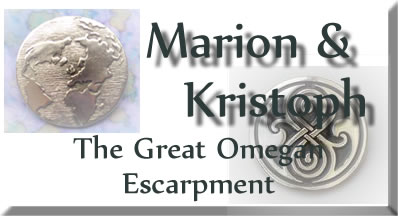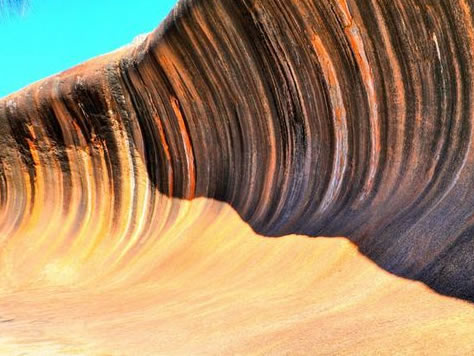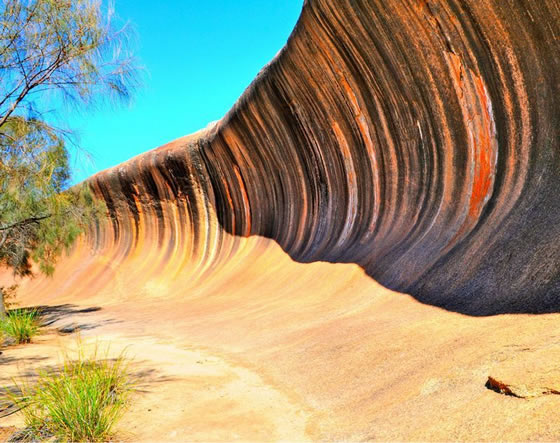

Kristoph looked at the group of boys who looked back at him expectantly. They were all dressed for hiking in the desert with lightweight packs and water reservoirs on their backs. They were ready to go.
“Remember, compasses are useless,” he said. “Even the TARDIS navigation is starting to be unreliable this close to the boundary of Dark Territory. We find our way by our wits. Was anyone foolish enough to burden themselves with technology that won’t work in ten minutes time when we cross that invisible but very real frontier? Even a few ounces of unnecessary weight in your pockets will be irksome after a few hours.”
Two boys quietly took items from their pockets and left them on the console. They were small but sophisticated devices that would be utterly useless in that strange magnetic field called Dark Territory. Kristoph didn’t chastise them. He knew that countless young Celestial Intervention Agency trainees who didn’t believe the stories about this part of the desert had tried the same thing over the years. There was no electronic technology, no matter how many sophisticated shields it had, that would work. Even a TARDIS was rendered powerless in the Territory.
“Very well, let us begin our trek.”
He had ten boys with him, all eager for the adventure. He had promised them they would climb the Great Omegan Escarpment with him, and he kept his promises, even if this one had taken a very long time to organise.
The beginning of Dark Territory did, indeed, come very soon into the journey. Kristoph had brought the TARDIS as near as he dared without losing all control over his craft. They all felt the pressure on their psychic nerves. It was the equivalent of the ear-popping experienced when even ordinary jet planes reached altitude rapidly. They got used to it after a little while. Getting used to not using telepathy to talk to each other took longer and made them noisy. They tended to talk louder in compensation for the loss of their psychic faculties.
Kristoph didn’t mind. They were in a huge, wide, empty desert. Nobody and nothing would be disturbed by their chatter. He enjoyed listening to them. Much of their talk was unimportant. It was the talk of schoolboys. Even he, at his great age, remembered that kind of thing. He was glad that these schoolboys, who had been thrust into an adult world of conspiracy and attempted murder, still had the capacity for youthful trivia. Their innocence wasn’t completely destroyed by those past events.
They quietened as the twenty-five miles in the gradually warming morning started to tell on them. The sight of the escarpment in the distance was sobering, too. The closer it got, the more the daunting prospect of climbing it hit them. For those who hadn’t seen it before the true height of the escarpment was startling. They all wondered in muted tones about the forces of nature that had thrust that cliff up from the rest of the desert.
“It’s a fault line,” said a young man called Eston Cane. “I suppose it is safe? There’s no chance of an earthquake while we’re here?”
“Do you expect the Great Omegan Escarpment to sink back down again?” Rivan Maxic teased the boy. “With us halfway up it?”
They all laughed, but nervously, as if that prospect was added to the ordinary dangers.
“I doubt if that would happen,” Kristoph assured them. “But there certainly is seismic activity from time to time. It is monitored from an unmanned station on the moon. That is the only way to measure anything in Dark Territory. Most of it is micro-quakes. We would scarcely feel them even if we were at the epicentre.
Some of them seemed disappointed. They wanted something dramatic to happen on their trip.
“As if climbing the Escarpment wasn’t adventure enough?” Kristoph said to them with a gentle laugh. “If anyone is interested, I did experience a strong earthquake in Dark Territory once during my youth. It was utterly terrifying but worth extra credit for resourcefulness in the aftermath.”
That was enough to get their attention. Second hand excitement in the form of one of his stories about his Celestial Intervention Agency training coloured their imaginations as the journey progressed. The Escarpment loomed ever larger and the shadow, even of that great elevation, shortened as noon approached.
By the time they were close enough to touch the ancient rock that had been scoured by desert winds for as much as thirteen million years, there was barely a few hundred yards of shade and the air was hot. They pitched the tent that Kristoph was carrying on his own back and retreated into the protection of its cooling inner lining before the sun was directly overhead and the Escarpment reflected its light back raising the temperature still further.
“I miss real winter,” said Mica Alep Vansig as they drank fruit drinks that came as flat foil discs which rehydrated into a cup of liquid when pressed. “That is my one regret about life in the desert.”
“You will all be going to your homes for the winter break?” Kristoph asked them.
“Yes sir,” Mica replied. “But our home is in the Capitol. We won’t see much of the snow unless it’s a very cold winter.”
The seasons on the northern continent were troublesome. Despite its name, the southern part of the northern continent, where the Capitol was, lay far beyond the equator and shared the same seasons as the southern continent. The Red Desert stretched from the Tropic of Pazithi Vóto to the Tropic of Pazithi Bópeia where the Great Escarpment was and then northwards to the frozen pole many thousands of miles away. In that region, the desert was a frozen tundra, but still very much a desert in the sense of being lifeless. Needless to say, apart from Outlanders in the desert and some hardy mining communities in the tundra there were few people living in this part of Gallifrey. Outside the Capitol only the western continental coast was considered habitable in any civilised way. The estates and demesnes of the great Houses of the Northern Continent were all beachfront properties, and even they were abandoned for air-conditioned town houses under the Capitol’s enviro-dome by mid-Samavan.
Of course, that had been impossible last year. The quarantine forced those families to sit out the winter on their estates and the boys of the Desert Camp were even worse off, cut off from their loved ones through the whole season.
“I think I’d better invite you all to Winter Solstice at Mount Lœng House,” Kristoph said. “It has certainly started snowing there.”
“All of us?” one boy asked. “The whole school? Or just your favourites?”
“All of you,” he said. “And for the record I don’t have favourites. There are some of you who have come more readily to my notice, but mostly for your capacity for mischief. I don’t think that merits favouritism, do you?”
Most of the boys admitted that it was not in a sober tone, then somebody giggled and whispered something to another boy, who smothered a laugh.
“What was that?” Kristoph asked in a tone of mock censure. “Speak up, boy!”
“Sir….” The boy who had spoken first was Galen Arn, who Kristoph remembered as having suffered deep personal losses from the plague last year. He spoke hesitantly, as if he regretted the comment he had made to his friend. “I didn’t mean it. I really didn’t. I am sorry if I caused offence, my Lord… Excellency… Sir….”
“I’m not wearing the Sash of Rassilon so Excellency is not necessary, and Lordships hardly count for much under the midday sun in Dark Territory. Sir will do. But what was it you said? You might as well admit it.”
“I said… that… mischief… as you called it… is… exactly what The Executioner would favour.”
“And how did you come to know my Celestial Intervention Agency alias?” Kristoph asked.
“My uncle, Nicolai Arn is an agent,” Galen answered. “I remember him telling my father about you… when you were inaugurated as President. He thought it… odd… that a former assassin should be the most powerful man on our planet.”
“Your uncle ought to know better than to talk about such things outside the Agency,” Kristoph said. “And I don’t know what he means by ‘odd’. As for my thoughts about ‘mischief’, it is not something to admire. Mischief implies indiscipline, hasty and careless ideas carried out without thought of the consequences. An Agent doesn’t make ‘mischief’ he takes carefully calculated actions that don’t put his own life, or the lives of other colleagues, or indeed of innocent bystanders at risk.”
That settled the matter. The boys settled down on their sleeping mats to rest through the hottest part of the day. Since they had been up early most of them slept soundly. Kristoph did, too, once he was sure his charges were all quiet and that there was no danger outside the tent that he would not be alert to within seconds.
He woke the boys at a little after four o’clock and they ate a light but protein rich meal before they struck camp. An assortment of equipment was unpacked while the tent and bedrolls were packed away. All of the boys understood their function. They had practised on a climbing wall installed in the camp gym. They understood the importance of D-rings and belay lines, the correct fastenings of safety harnesses and that a crampon was not a funny sounding word but a tool that would help them climb the formidable cliff face in front of them.
They all looked up at it apprehensively. It was impossible to actually see the top of the Escarpment from the bottom. It made their practice on a mere twenty feet of wall seem feeble.
“The principle is exactly the same,” Kristoph told them before they lost their nerve completely. “Let’s get started. You all know what to do.”
Riven Maxic and Salika Goth went first. They were the best climbers and the physically strongest of the boys. Then the others followed. Kristoph brought up the rear, calling out encouragement to them all and watching for any hesitancy or uncertainty among them.
They had climbed a good fifty feet before they started to realise that they were in unknown territory. This was very much higher than they had ever climbed before. One by one they started to glance down nervously.
“Stop where you are, all of you,” Kristoph called out. “And take a good look. Get used to it before we go any higher, and then the sight won’t unnerve you. Go on, try it.”
He had been told that the first time he climbed the Escarpment by his trainer. The advice was well given. Many a time in his CIA career he had found it necessary to scale walls, or climb across roofs, or travel by zip wires from one building to another, and the dizzying and fatal drop beneath him never worried him once he had looked at it firmly.
He was surprised and pleased to discover the same advice in his favourite gothic novel during his time on Earth. Jonathon Harker, escaping from Dracula’s Castle by climbing down the sheer wall, looked down resolutely in case a sudden glance unnerved him.
Now his young Arcalians took the same advice. They saw what they had to fear and learned not to fear it. Now they were ready to climb higher, to conquer the highest point in the desert that was their home for the foreseeable future. They did so bravely and calmly, moving slowly up the sheer rock face, finding hand and footholds where they could, making them where they couldn’t.
The afternoon wasn’t without incident. Sometimes they misjudged their footing and slipped. That was why they were all on a safety line. Twice, Kristoph had to climb up and free boys who had become entangled in their ropes, and there was one case where a boy panicked and froze, unable to go up or down. Kristoph was saved the trouble of climbing up to him, though. Galen Arn came down to the frightened boy and spoke calmly to him until he was ready to put one hand up to the next crevice in the rockface and move one of his frozen feet a few more inches. Slowly he regained his confidence and the expedition went onwards and upwards once more.
It took seven hours. The cool of evening was starting to be felt by the time they neared the plateau above. There was almost a sense of hurry. They worried about being on the cliff-face still when it became too dark to see. But there was still an hour of daylight by the time they were all safely at the top.
They watched the sunset over the plateau before making camp for the night, tired but proud of their own achievement. They ate another rehydrated meal around a camp fire and Nico pointed out his favourite constellations to them all while Kristoph told stories of his visits to some of the worlds up there, many of which visits were in the name of Gallifreyan security and involved acts of necessary violence that he made sure not to glamorise for impressionable boys.
When the young Arcalians went to bed Kristoph waited by the dying fire for a while. He wasn’t entirely surprised when he saw a shadow in the darkness beyond the camp. He stood up and walked towards the visitor.
“Braxietel,” he said.
“De Lœngbærrow,” replied the Outlander in an educated accent he only rarely used. “You know, of course, that we were watching you all day.”
“I would expect nothing less. How are you, my old friend? Do you know of the troubles we had last winter? Did they affect your people?”
“The plague, news of it reached even us. But the plague did not. We were safe. My thanks for your concern, however.”
Braxietel paused then asked a question Kristoph expected.
“My brother and his family….”
“They are well. They were in the Capitol throughout the quarantine, but the illness did not come to their household.”
“Good. I have not seen Pól for a very long time, but I wish him no harm.”
“And he likewise,” Kristoph assured him.
“Your own family?” Braxietel asked.
Kristoph did not answer at once. The Outlander with the perceptive instincts of his tribe gathered all he needed to know from his silence.
“I am sorry for your loss,” he said.
There was another silence then Braxietel said something else.
“These boys you enjoy spending so much time with…. They all have families of their own?”
“They do.”
“Then be careful of giving your hearts too deeply to them. They’re not your sons. Don’t make them substitutes for your affections.”
“I… don’t,” Kristoph said. But that was not entirely true. Despite his assurance that he had no favourites, he did think quite fondly of the first boys he had come to know: Gynnell Dúccesci, his would be assassin who had made his peace with him, Riven and Salika who were so much like himself at that age, the gentle twins, Mica and Nico, and even the motherless Galen Arn. He did look at them and see surrogate sons.
“You’re teaching them a lot. Don’t let go of that, for their sakes,” Braxietel told him. “But remember they call other men father.”
“I will take your advice,” Kristoph said to him. “I haven’t given up hope. I know I will have a son in the course of time. I expect I will teach him the same lessons.”
“Indeed, you will,” Braxietel assured him. “What are your plans for the morning? Will you go further into Dark Territory?”
“Do you ask out of interest in our adventure or to avoid contact between my boys and your tribe?”
“Both,” Braxietel answered. “Though we are aware of your presence and can avoid you easily enough.”
“We will walk along the escarpment for a while,” Kristoph said. “To a slightly lower point. Then I plan to introduce them to the sport of abseiling. I think they are ready for that challenge. After that it is an easy hike back to where my TARDIS is waiting and they will be back at school for supper time.”
“A good day’s adventure for healthy boys. I wish you a good journey, my friend.”
“They will complain that yet again they have not met an Outlander,” Kristoph noted. “But that is for the best. Our worlds should not collide any more often than necessary.”
Braxietel wished him a good journey and departed. Kristoph watched him until his shadow melted into the darkness then went into the tent. As he prepared to sleep his last thought was for Marion and being with her again when this adventure was done.

 |
 |
 |